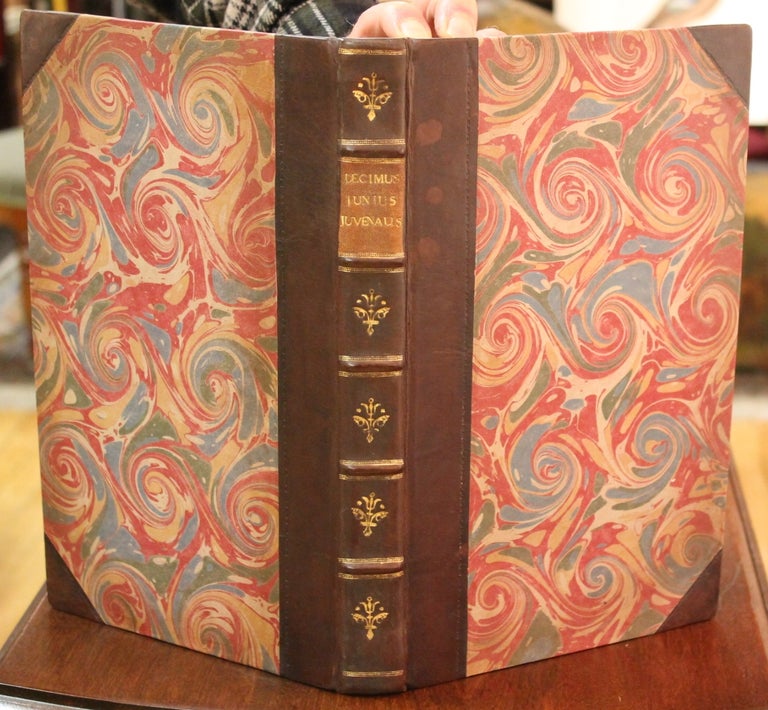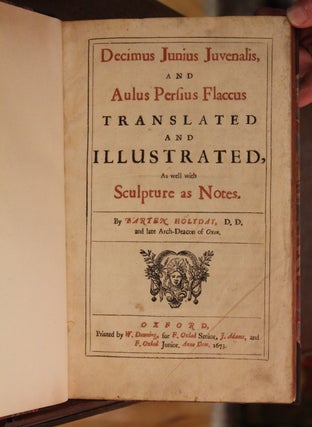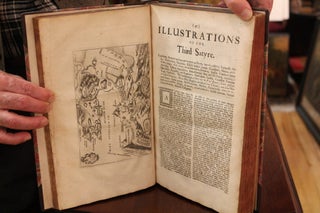Decimus Junius Juvenalis, and Aulus Persius Flaccus Translated and Illustrated, As well with Sculpture as Notes. / By Barten Holyday, D.D. and late Arch-Deacon of Oxon.
Oxford: F. Oxlad sen., J. Adams, & F. Oxlad jun. c. 1673. Binding: Recent ½ calf with marbled boards, spine in six compartments of raised gilt-lined bands and gilt floral motifs, gilt ochre morocco label on two, all edges tinted red, endpapers renewed. , Notes: Persius (or Aulus Persius Flaccus, AD 34-62) was a Roman satirical poet. A member of a distinguished family, he went to Rome in boyhood, was educated there and came under the influence of the Stoic philosopher Lucius Annaeus Cornutus, to whom he became attached in lasting friendship. Gentle and modest by nature, Persius had high moral standards. His writings (only six short satires), influenced in manner by Horace and Lucilius, preach Stoic moral doctrine. He exposed to censure the corruption and folly of contemporary Roman life, contrasting it with the ideals of the Stoics and of earlier Rome. Persius’ writing is harsh, obscure and difficult to translate.
Decimus Junius Juvenalis was a Roman satirist who denounced the vice and folly of Roman society during the reign of the emperor Domitian (60-140). Like most ancient satire, the writings of Juvenal are essentially conservative. In order to avoid censorship he chose as his targets people who had lived a century before; but he clearly meant to describe what he saw as the faults of his own time. In his Third Satire he gives us a wonderfully intimate and lively portrait of daily life in the streets of imperial Rome. In the poem, a friend of Juvenal’s is moving to a place in the countryside, and it is he who details what he can’t stand about the city.
, Size: Tall 4to, Illustration: Title printed in red and black and with publisher's device. With 2 maps, 2 portraits, 1 folded print, and 43 in-text illustrations, as well as a profusion of elaborate head and tailpieces., References: Wing 1276., Pages: P.b2, 341., Category: ; Book Classics; Book Literature. Occasional brown spots, otherwise a very good copy. Item #B1444
Binding: Recent ½ calf with marbled boards, spine in six compartments of raised gilt-lined bands and gilt floral motifs, gilt ochre morocco label on two, all edges tinted red, endpapers renewed. , Notes: Persius (or Aulus Persius Flaccus, AD 34-62) was a Roman satirical poet. A member of a distinguished family, he went to Rome in boyhood, was educated there and came under the influence of the Stoic philosopher Lucius Annaeus Cornutus, to whom he became attached in lasting friendship. Gentle and modest by nature, Persius had high moral standards. His writings (only six short satires), influenced in manner by Horace and Lucilius, preach Stoic moral doctrine. He exposed to censure the corruption and folly of contemporary Roman life, contrasting it with the ideals of the Stoics and of earlier Rome. Persius’ writing is harsh, obscure and difficult to translate.
Decimus Junius Juvenalis was a Roman satirist who denounced the vice and folly of Roman society during the reign of the emperor Domitian (60-140). Like most ancient satire, the writings of Juvenal are essentially conservative. In order to avoid censorship he chose as his targets people who had lived a century before; but he clearly meant to describe what he saw as the faults of his own time. In his Third Satire he gives us a wonderfully intimate and lively portrait of daily life in the streets of imperial Rome. In the poem, a friend of Juvenal’s is moving to a place in the countryside, and it is he who details what he can’t stand about the city.
, Size: Tall 4to, Illustration: Title printed in red and black and with publisher's device. With 2 maps, 2 portraits, 1 folded print, and 43 in-text illustrations, as well as a profusion of elaborate head and tailpieces., References: Wing 1276., Pages: P.b2, 341., Category: ; Book Classics; Book Literature.
Price: $1,250.00



